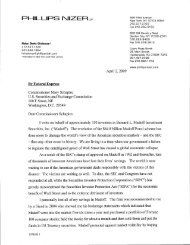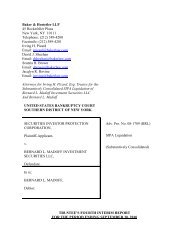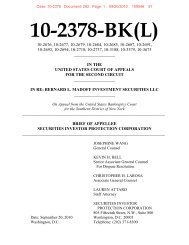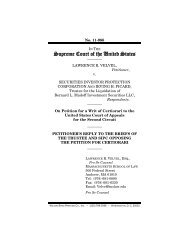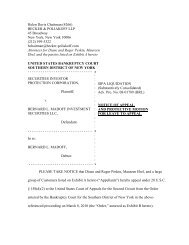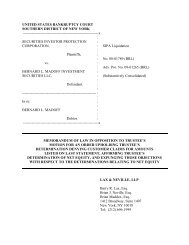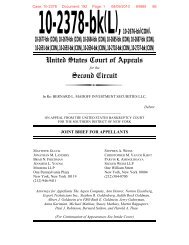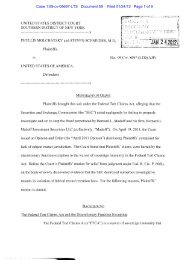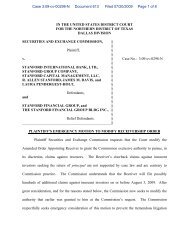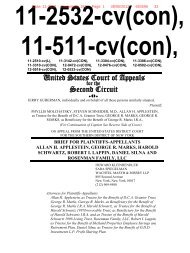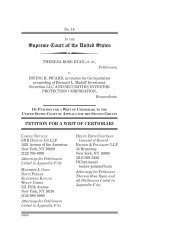Davis Polk & Wardwell LLP 450 Lexington Avenue New York, New ...
Davis Polk & Wardwell LLP 450 Lexington Avenue New York, New ...
Davis Polk & Wardwell LLP 450 Lexington Avenue New York, New ...
Create successful ePaper yourself
Turn your PDF publications into a flip-book with our unique Google optimized e-Paper software.
2002 WL 32500567, at *8 (W.D.N.Y. June 21, 2002) (rejecting trustee’s effort to claw<br />
back profits from “an innocent investor, who has received a bargained-for, contractual<br />
interest payment, at a commercially reasonable rate”); In re Unified Commercial Capital,<br />
260 B.R. 343, 351 (Bankr. W.D.N.Y. 2001).<br />
Notwithstanding the Second Circuit’s decision in Sharp, some courts have applied<br />
the so-called “Ponzi scheme presumption,” but only where the transfer at issue did not<br />
satisfy antecedent debt. See In re Bayou Group, LLC, 362 B.R. 624, 638 (Bankr.<br />
S.D.N.Y. 2007) (concluding that equity holders – as opposed to creditors – of the<br />
fraudulent enterprise did not have contractual rights to payments on their investments,<br />
“[i]n contrast to the lawful and disclosed payment of a valid contractual antecedent debt<br />
in Sharp”); In re Manhattan Investment Fund Ltd., 397 B.R. 1, 11 (S.D.N.Y. 2007)<br />
(distinguishing Sharp on the ground that the transfers to Bear Stearns did not repay loans<br />
or services or satisfy other antecedent debts).<br />
“Simply because a debtor conducts its business fraudulently does not<br />
make every single payment by the debtor subject to avoidance. If so,<br />
every vendor supplying goods to the debtor would receive an avoidable<br />
fraudulent transfer when the debtor paid the vendor’s invoice. Every<br />
employee, even lower-level custodial and clerical employees, would be<br />
required to return their wages, regardless of the work they performed.<br />
Landlords would have to return rent payments, even if the debtor actually<br />
occupied the leased premises. No one conducting business with a debtor<br />
operating a Ponzi scheme could prevent the avoidance of payments they<br />
received from the debtor, regardless of the extent of the transferee’s<br />
knowledge or culpability or the actual services provided. The law does<br />
not require this result.” In re World Vision Entm’t, Inc., 275 B.R. 641,<br />
658 (Bankr. M.D. Fla. 2002).<br />
Some courts have invoked “equity” or “morality” or “public policy” to justify<br />
avoiding transfers of profits to Ponzi scheme victims, even though the transfers were<br />
contractually required or otherwise legally mandated. See, e.g., Donell v. Kowell, 533<br />
F.3d 762, 776 (9th Cir. 2008) (concluding that transfers of profits to Ponzi scheme<br />
25



